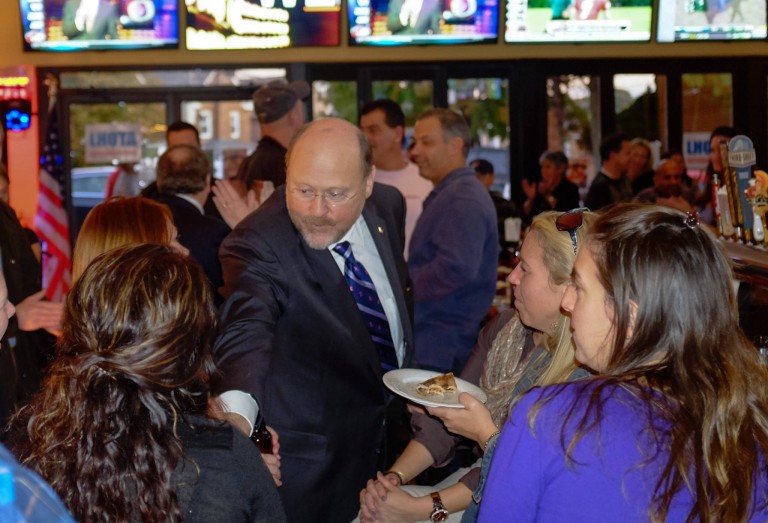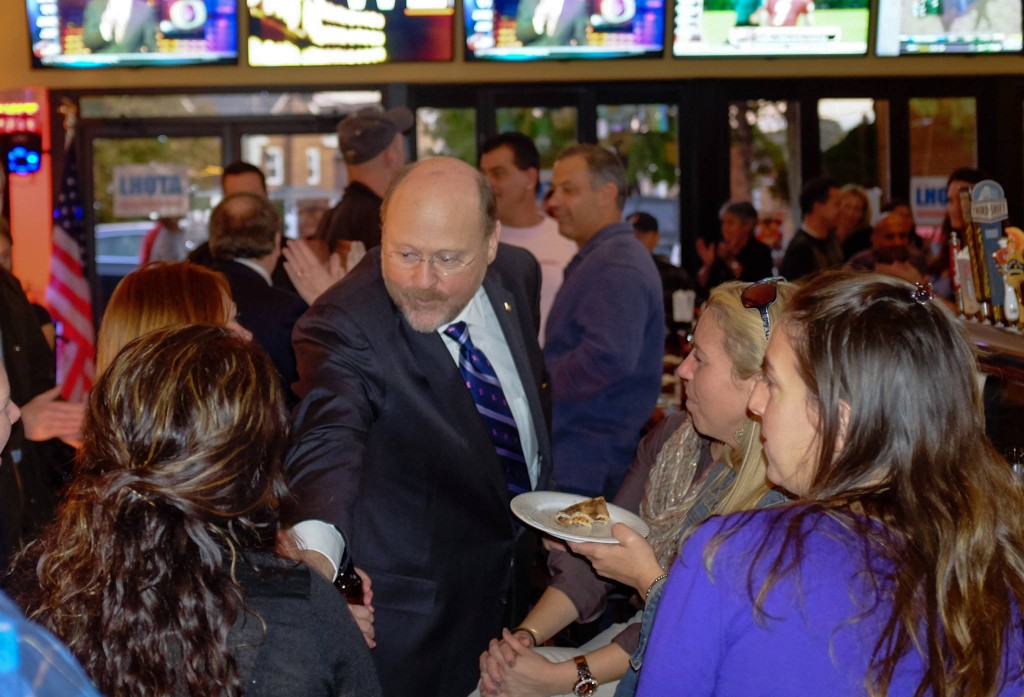Joe Lhota performed all of the duties necessary of someone campaigning for mayor, following a specific script.
O’Neill’s, a Maspeth bar and eatery, was extra crowded last Friday, housing both normal patrons reveling after a week of hard work and constituents there to see Lhota – the Republican candidate running against Democratic candidate Bill de Blasio for the city’s top spot. Lhota shook every hand presented to him with a warm smile. He posed for pictures with those clutching iPhones. He answered the cavalcade of inquiries with brevity and simplicity.
He also spoke to two sections of the restaurant. First, he delivered a carefully crafted tale to members of the local unions. Lhota went to Georgetown with the help of a scholarship from his father’s union. His dad was an officer with the NYPD; his grandfather was a firefighter. He said he would never forget this generosity; indeed, he was the first member of his family to go to college.
This narrative helps Lhota curry favor less than two weeks before the Nov. 5 general election with potential constituents who want him to crack down on crime and union members. Art Gault was one of the Queens residents who came to see Lhota. Gault supports the Republican candidate for mayor because he believes Lhota will be tougher on crime than his opponent.
“On the big issues they’re very similar,” Gault said. “The difference between them is crime. I grew up in New York. I saw what is was like in the ‘80s.”
Tom Larkin, a laborer from Long Island, heartedly supported Lhota, but was aware of the Republican party’s long history of anti-union ideology. Larkin’s primary issue was the enforcement of the same regulations imposed on union workers that exists for private contractors.
“I’ll vote for the guy who does what’s right,” Larkin said.
Lhota’s second foray into oration used a general message. He talked about his fiscal conservative policies, plans to reduce taxes, and regulations to entice more businesses to settle in New York.
“I want to be the mayor who makes New York a great place to live, a great place to grow,” said Lhota, who, according to the most recent New York Times/Siena College poll, is trailing de Blasio by 45 points.
The candidate also extolled the virtues of the middle class and brought up taking care of firefighters after Sept. 11, 2001 as a part of the talking-point buffet. As Lhota prepared to leave the establishment, one constituent offered a cry of “beat that socialist,” to which Lhota responded with a somewhat reluctant thumbs up.
All of this trail stomping paints a simplistic portrait of a man with a full resume of city government experience, including a stint as deputy mayor under former Mayor Rudy Giuliani. In fact, Lhota is a part of rare species these days: a Republican willing to spend government dollars.
One of Lhota’s primary issues is affordable housing. Lhota has a plan to use $8 billion of public money to finance the refurbishing of current housing and the building of new housing. Lhota made it a point to mention that New Yorkers pay an exorbitant percentage of their salaries on rent, the highest in the United States. Lhota is literally willing to put his money where his mouth is to improve the lives of the working middle class.
That housing plan does not include rebuilding after Hurricane Sandy. Lhota said that will be an entirely different project, even more important.
“I’m not happy with where we are,” Lhota said of the current rebuilding projects. “We have way too many people not back in their homes.”
Olivia Henderson signed up to volunteer for Lhota at a fundraiser. The main issue that sold her on the candidate was his support for charter schools. Lhota wants to see charter schools in every borough. He added that he wants to improve all of the public schools in New York. Included in his plan are new ways to evaluate teachers and administrators, but money has to be spent to improve schools: materials, infrastructure, and teacher salaries.
However, Lhota’s policies are still conservative. His answer to lengthy emergency room wait times at public hospitals like Queens Hospital Center was to encourage more urgent care centers. Most urgent care centers are privately funded and are an emerging investment with more Americans likely to have health insurance with the impending passage and implementation of the Affordable Care Act.
“We need to look at what they’re doing in the Bronx,” Lhota said. “That’s the model that’s working.”
And like any successful politician, Lhota knows no answer is sometimes the best answer. He was asked about the Queensway project. Some Queens’ residents want the abandoned rail line converted into a park, like Manhattan’s High Line. The High Line of course features a plethora of successful businesses around the tourist attraction. Others, including officials like U.S. Rep. Hakeem Jeffries (D-Queens, Brooklyn), want the rail line reactivated.
Lhota said he was often asked which option he preferred when he ran the Metropolitan Transit Authority. He sees the positives in either plan.
“The people of Queens need to decide that,” he said.
By Ben Kleine


